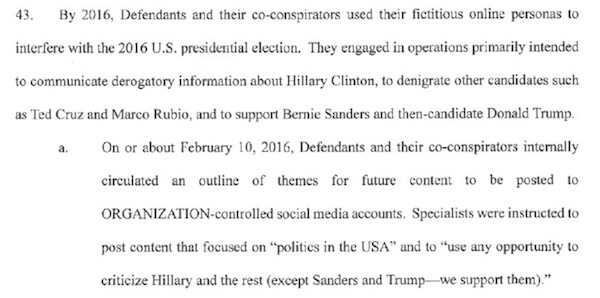Who Is Indicted Russian Oligarch Yevgeny Prigozhin, and What Are His Connections to Putin?
One of the key figures indicted by a grand jury in the Russia collusion investigation today is Yevgeny Prigozhin, the so-called “chef to Putin.” Who is this fellow, and what connections does he have to the Russian government, if any?
The question is important, because there are no specific allegations in the indictment showing that the Russian government was behind the efforts to influence the 2016 U.S. election decribed in the document. Still, the New York Times explains that “American intelligence agencies have said that Russian President Vladimir V. Putin authorized a multipronged campaign to boost Mr. Trump’s political chances and damage Mrs. Clinton. The indictment points out that the two Russian firms involved in financing it hold various Russian government contracts.” So Prigozhin’s ties to Putin, if any, are a significant component of any analysis of the extent to which Russian interference can be traced to the Kremlin.
It has been known since at least October 2017 that Prigozhin was the financier of a troll factory designed to influence the 2016 U.S. presidential election. For example, CNN reported last October:
Yevgeny Prigozhin is a Russian oligarch dubbed “chef” to President Vladimir Putin by the Russian press. In 2002, he served caviar and truffles to President George W. Bush during a summit in St. Petersburg. Before that, he renovated a boat that became the city’s most exclusive restaurant.
But his business empire has expanded far beyond the kitchen. US investigators believe it was Prigozhin’s company that financed a Russian “troll factory” that used social media to spread fake news during the 2016 US presidential campaign, according to multiple officials briefed on the investigation. One part of the factory had a particularly intriguing name and mission: a “Department of Provocations” dedicated to sowing fake news and social divisions in the West, according to internal company documents obtained by CNN.
Portraits from the past and emerging today show (unsurprisingly) an oligarch with very close ties to Putin. The New York Times today has a piece titled Meet Yevgeny Prigozhin, the Russian Oligarch Indicted in U.S. Election Interference. His ties to Putin as described in the piece are clear and convincing:
Mr. Prigozhin’s critics — including opposition politicians, journalists and activists, the United States Treasury and now Mr. Mueller — say he has emerged as Mr. Putin’s go-to oligarch for that and a variety of sensitive and often-unsavory missions, like recruiting contract soldiers to fight in Ukraine and Syria.
“He is not afraid of dirty tasks,” said Lyubov Sobol of the Anti-Corruption Foundation, an organization established by the prominent opposition leader Aleksei A. Navalny to investigate abuse of state contracts and other illicit schemes.
“He can fulfill any task for Putin, ranging from fighting the opposition to sending mercenaries to Syria,” she said. “He serves certain interests in certain spheres, and Putin trusts him.”
Speaking of Navalny, his investigators revealed in May 2017 that the oligarch was earning billions in Kremlin-awarded defense contracts:
Alexei Navalny’s Anti-Corruption Foundation (ACF) published its latest investigative work on Friday, revealing what it says is a cartel of businesses owned by Yevgeny Prigozhin and contracted by the Defense Ministry. Widely known as “Vladimir Putin’s favorite chef,” Prigozhin is a billionaire restaurateur with a history of catering to St. Petersburg’s elites and winning lucrative federal procurement deals. According to ACF, his cartel has won more than 23 billion rubles ($405 million) in defense contracts.
. . . .
ACF says its report concerns just one of Prigozhin’s cartels. According to Navalny, the billionaire operates several similar schemes that have won a total of 180 billion rubles ($3.2 billion) in Russian defense contracts, including multiple no-bid procurement deals.
Putin has definitely scratched Prigozhin’s back — and in setting up his troll factory, Prigozhin appears to have been scratching Putin’s in return. And the mission, according to the indictment, was to push Trump and Bernie Sanders — anybody but Hillary, Ted Cruz, or Rubio:

So don’t get the idea that these were random Russians who were trying to influence our elections. This was the Russian government, acting through proxies. There is no other logical conclusion.
P.S. By coincidence, I posted this morning about Navalny and his anti-corruption investigations — and how Putin has managed to get Facebook to remove from Instagram some of the evidence supporting those investigations. My post was instantly lost in the welter of news about Mueller’s indictments, but I suggest you take a look at it. In particular, I discussed how Navalny recently provided compelling evidence that another oligarch tied to Paul Manafort, Oleg Deripaska, has met with and bribed Russian Deputy Prime Minister Sergei Prikhodko, a high-ranking Kremlin official with close ties to Putin. It has been known for months, through an email from Manafort, that Manafort had offered to give private briefings to Deripaska about the 2016 election. Navalny’s investigation suggests that those briefings actually used Deripaska as a conduit between Manafort and the Kremlin.
Thus, we may have evidence of a fairly direct link between Trump’s one-time campaign manager and the Kremlin, relating to the 2016 presidential election. This doesn’t mean Trump was tied to the Kremlin himself, of course — but the evidence is increasingly clear that his campaign manager was. I suspect we haven’t heard the last of this.
Vladimir Putin is the biggest oligarch of them all, and he uses other oligarchs (who owe their wealth to their ability to please Putin) to do his bidding. Again: there is no question but that the indictments issued today relate, not just to any random Russia operation to disrupt our election, but one directed by Vladimir Putin himself. If Russia cooperates in handing over these people for prosecution — in particular Prigozhin himself — I will be very surprised.
[Cross-posted at RedState and The Jury Talks Back.]


